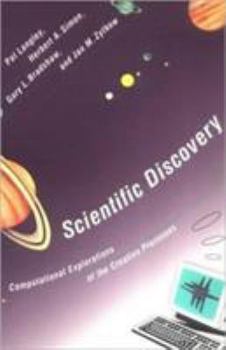Scientific Discovery: Computational Explorations of the Creative Processes
Select Format
Select Condition 
Book Overview
Scientific discovery is often regarded as romantic and creative--and hence unanalyzable--whereas the everyday process of verifying discoveries is sober and more suited to analysis. Yet this fascinating exploration of how scientific work proceeds argues that however sudden the moment of discovery may seem, the discovery process can be described and modeled. Using the methods and concepts of contemporary information-processing psychology (or cognitive science) the authors develop a series of artificial-intelligence programs that can simulate the human thought processes used to discover scientific laws. The programs--BACON, DALTON, GLAUBER, and STAHL--are all largely data-driven, that is, when presented with series of chemical or physical measurements they search for uniformities and linking elements, generating and checking hypotheses and creating new concepts as they go along. Scientific Discovery examines the nature of scientific research and reviews the arguments for and against a normative theory of discovery; describes the evolution of the BACON programs, which discover quantitative empirical laws and invent new concepts; presents programs that discover laws in qualitative and quantitative data; and ties the results together, suggesting how a combined and extended program might find research problems, invent new instruments, and invent appropriate problem representations. Numerous prominent historical examples of discoveries from physics and chemistry are used as tests for the programs and anchor the discussion concretely in the history of science.
Format:Paperback
Language:English
ISBN:0262620529
ISBN13:9780262620529
Release Date:February 1987
Publisher:Mit Pr
Length:344 Pages
Weight:1.30 lbs.
Dimensions:9.3" x 1.0" x 6.3"
Age Range:18 years and up
Grade Range:Postsecondary and higher
Customer Reviews
2 ratings
Eureka! A truly pioneering work.
Published by Thriftbooks.com User , 19 years ago
Computational philosophy of science will define twenty-first philosophy of science, and it has already started. This book by Herbert Simon, Nobel laureate and one of the founders of artificial intelligence, describes several computerized discovery systems created under Simon's direction at Carnegie-Melon University in the 1980's. In his book titled Novum Organon Francis Bacon had expressed the view that with a few easily learned rules or a method it may be possible for anyone undertaking scientific research to be successful. Today Bacon's agenda is called proceduralization for computerized mechanization, and it is appropriate therefore that one of the most extraordinary discovery systems - Pat Langley's - should be named BACON. The BACON discovery system is actually a set of successive and increasingly sophisticated discovery systems that make quantitative empirical laws and theories. Given sets of observation measurements for two or more variables, BACON searches for functional relations among the variables. The original version was designed and implemented by Pat Langley in 1979 as the thesis for his Ph.D. dissertation at Carnegie-Mellon department under Simon's direction. System BACON has rediscovered several historically significant empirical laws including Boyle's law of gases, Kepler's third planetary law, Galileo's law of motion of objects on inclined planes, Boyle's ideal gas law, Coulomb's law of electrical current, Ohm's law of electrical circuits, Archimedes law of displacement, Black's law of specific heat, Newton's law of gravitation, the law of conservation of momentum, and the laws describing chemical reactions formulated by Dalton, Gay-Lussac, and Comizzaro. Other discovery systems also described in this book are: System GLAUBER named after the eighteenth century chemist, Johann Rudolph Glauber, who contributed to the development of the acid-base theory. System STAHL named after the German chemist, Georg Ernst Stahl, who developed the phlogiston theory of combustion. System DALTON named after John Dalton, who developed the atomic theory of matter. Readers interested in more commentary on Simon are invited to Google my book titled History of Twentieth-Century Philosophy of Science at my com web site named philsci on the Internet for free downloads. Thomas J. Hickey
A must reading for all who work with computers
Published by Thriftbooks.com User , 27 years ago
A book which opens a new direction in mankind's outlook towards itself. Talks about how the ultimate quality, namely the creativity, which distinguishes humans from all the animals, is not unique. Should be compulsory reading for all students of computers, if not everybody. Hundred years form now, scientists will call this the first book ever published.





